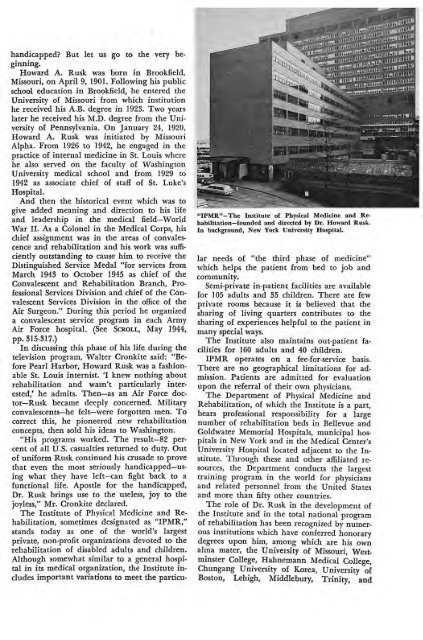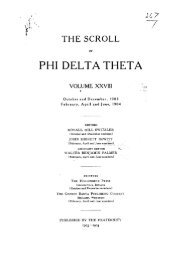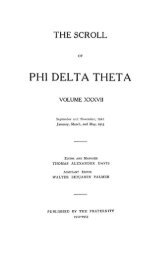- Page 1 and 2: O F P H D E L T A T H E T ASeptembe
- Page 3 and 4: in this issueSEPTEMBER • 1964Vol.
- Page 5 and 6: OHIO BETA imdergraduates made pilgr
- Page 8 and 9: Bob Glen Studios—New YorkSTAGE IS
- Page 10 and 11: RON'ORED GUEST Ralph J. Cordiner, W
- Page 14 and 15: 12 THE SCROLL of Phi Delta Theta fo
- Page 16 and 17: PHIS OF ACHIEVEMENTIn Winning Disti
- Page 18 and 19: 16 THE SCROLL of Phi Delta Theta fo
- Page 20 and 21: 18 THE SCROLL of Phi Delta Theta fo
- Page 22 and 23: 20 THE SCROLL of Phi Delta Theta fo
- Page 24 and 25: 22 THE SCROLL of Phi Delta Theta fo
- Page 26 and 27: 24 THE SCROLL of Phi Delta Theta fo
- Page 28 and 29: 26 THE SCROLL of Phi Delta Theta fo
- Page 30 and 31: SHORT SHOTS from the ALUMNI FIRING
- Page 32 and 33: 30 THE SCROLL of Phi Delta Theta fo
- Page 34 and 35: CANDIDATES for the 1964 All-Phi foo
- Page 36 and 37: 34 THE SCROLL of Phi Delta Theta fo
- Page 38 and 39: THE SEVENTEENTH PHI DELTBy Dr. John
- Page 40 and 41: 38 THE SCROLL of Phi Delta Theta fo
- Page 42 and 43: CSD PROJECT chosen by Pennsylvania
- Page 44 and 45: 42 THE SCROLL of Phi Delta Theta fo
- Page 46 and 47: 44 THE SCROLL of Phi Delta Theta fo
- Page 48 and 49: 46 THE SCROLL of Phi Delta Theta fo
- Page 50 and 51: 48 THE SCROLL of Phi Delta Theta fo
- Page 52 and 53: 50 THE SCROLL of Phi Delta Theta fo
- Page 54 and 55: 52 THE SCROLL of Phi Delta Theta fo
- Page 56 and 57: 54 THE SCROLL of Phi Delta Theta fo
- Page 58 and 59: 56 THE SCROLL of Phi Delta Theta fo
- Page 60 and 61: 58 THE SCROLL of Phi Delta Theta fo
- Page 62 and 63:
60 THE SCROLL of Phi Delta Theta fo
- Page 64 and 65:
* * * THE CHAPTER GRAND • * •Dr
- Page 66 and 67:
64 THE SCROLL of Phi Delta Theta fo
- Page 68 and 69:
66 THE SCROLL of Phi Delta Theta fo
- Page 70 and 71:
68 THE SCROLL of Phi Delta Theta fo
- Page 72 and 73:
RHO SOUTH—(Southern Texas)—Pres
- Page 74 and 75:
OKLAHOMA BETA (1946), Oklahoma Stat
- Page 76 and 77:
Postmaster; Please send noticeof un
- Page 78 and 79:
Join the $100 Club of thePhi Delta
- Page 80 and 81:
76 THE SCROLL of Phi Delta Theta fo
- Page 82 and 83:
78 THE SCROLL of Phi Delta Theta fo
- Page 84 and 85:
80 THE SCROLL of Phi Delta Theta fo
- Page 86 and 87:
GREAT CONVENTION MUSIC was furnishe
- Page 88 and 89:
84 THE SCROLL of Phi Delta Theta fo
- Page 90 and 91:
•OWERFUL TESTIMONY to the life-lo
- Page 92 and 93:
!iih«ii!!'^2.iSERENADES. Hanover C
- Page 94 and 95:
UNDERGRADUATE PARTICIPATION in the
- Page 96 and 97:
PHI LADIES enjoyed a varied program
- Page 98 and 99:
AWARD WINNERS ARE ANNOUNCEDOutstand
- Page 100 and 101:
FIRST TRAUTMAN AWARD ISKeith Weber,
- Page 102 and 103:
98 THE SCROLL of Phi Delta Theta fo
- Page 104 and 105:
100 THE SCROLL of Phi Delta Theta f
- Page 106 and 107:
WITH PHIS IN THE WORLD OF SPORTSBy
- Page 108 and 109:
104 THE SCROLL of Phi Delta Theta f
- Page 110 and 111:
THE ALUMNI FIRING LINEFrancis A. Pi
- Page 112 and 113:
108 THE SCROLL of Phi Delta Theta f
- Page 114 and 115:
110 THE SCROLL of Phi Delta Theta f
- Page 116 and 117:
112 THE SCROLL of Phi Delta Theta f
- Page 118 and 119:
BRIEF ITEMS about PHIS with the COL
- Page 120 and 121:
ALUMNI CLUB NOTESJUDGE W. BEARDEN,
- Page 122 and 123:
118 THE SCROLL of Phi Delta Theta f
- Page 124 and 125:
120 THE SCROLL of Phi Delta Theta f
- Page 126 and 127:
122 THE SCROLL of Phi Delta Theta f
- Page 128 and 129:
124 THE SCROLL of Phi Delta Theta f
- Page 130 and 131:
126 THE SCROLL of Phi Delta Theta f
- Page 132 and 133:
128 THE SCROLL of Phi Delta Theta f
- Page 134 and 135:
130 THE SCROLL of Phi Delta Theta f
- Page 136 and 137:
132 THE SCROLL of Phi Delta Theta l
- Page 138 and 139:
134 THE SCROLL of Phi Delta Theta f
- Page 140 and 141:
136 THE SCROLL of Phi Delta Theta f
- Page 142 and 143:
138 THE SCROLL of Phi Delta Theta f
- Page 144 and 145:
140 THE SCROLL of Phi Delta Theta f
- Page 146 and 147:
142 THE SCROLL of Phi Delta Theta f
- Page 148 and 149:
144 THE SCROLL of Phi Delta Theta f
- Page 150 and 151:
146 THE SCROLL of Phi Delta Theta f
- Page 152 and 153:
148 THE SCROLL of Phi Delta Theta f
- Page 154 and 155:
150 THE SCROLL of Phi Delta Theta f
- Page 156 and 157:
152 THE SCROLL of Phi Delta Theta f
- Page 158 and 159:
• • • THE CHAPTER GRAND •
- Page 160 and 161:
156 THE SCROLL of Phi Delta Theta f
- Page 162 and 163:
158 THE SCROLL of Phi Delta Theta f
- Page 164 and 165:
160 THE SCROLL of Phi Delta Theta f
- Page 166 and 167:
DIRECTORYTHE PHI DELTA THETAFRATERN
- Page 168 and 169:
164 THE SCROLL of Phi Delta Theta f
- Page 170 and 171:
166 THE SCROLL of Phi Delta Theta f
- Page 172 and 173:
168 THE SCROLL of Phi Delta Theta f
- Page 174 and 175:
Authentically designed blazer butto
- Page 176 and 177:
Statements as to the valueof frater
- Page 178 and 179:
PHIS ACTIVEin theMAYO "MIRACLE'Twel
- Page 180 and 181:
172 THE SCROLL of Phi Delta Theta f
- Page 182 and 183:
PLUMMER BUILDING of the Mayo Clinic
- Page 184 and 185:
176 THE SCROLL of Phi Delta Theta f
- Page 186 and 187:
EIGHTEEN PHIS IN 89th CONGRESSNovem
- Page 188 and 189:
180 THE SCROLL of Phi Delta Theta f
- Page 190 and 191:
^S3 f^t^THREE BACKSWIN BOARD'SUNANI
- Page 192 and 193:
ALL-PHI SECOND TEAM: Clint Eudy, No
- Page 194 and 195:
All-Phi Second TeamRich McCurdy, Ok
- Page 196 and 197:
ANOTHER QUINTET OF LITTLE ALL-PHI R
- Page 198 and 199:
MINNESOTA BETA CHAPTER at Mankato S
- Page 200 and 201:
MICHIGAN ALPHAMARKS CENTENNIALChapt
- Page 202 and 203:
THREE VIEWS: At left. West Bay—la
- Page 204 and 205:
This informal chat with Major Gener
- Page 206 and 207:
198 THE SCROLL of Phi Delta Theta f
- Page 208 and 209:
PotpourriDallas Times-HeraldLINDSEY
- Page 210 and 211:
WITH PHIS IN THE WORLD OF SPORTSBy
- Page 212 and 213:
THE ALUMNI FIRING LINEVictor Oland
- Page 214 and 215:
206 THE SCROLL of Phi Delta Theta f
- Page 216 and 217:
208 THE SCROLL of Phi Delta Theta f
- Page 218 and 219:
210 THE SCROLL of Phi Delta Theta f
- Page 220 and 221:
212 THE SCROLL of Phi Delta Theta f
- Page 222 and 223:
DIRECTORYTHE PHI DELTA THETAFRATERN
- Page 224 and 225:
216 THE SCROLL of Phi Delta Theta f
- Page 226 and 227:
218 THE SCROLL of Phi Delta Theta f
- Page 228 and 229:
220 THE SCROLL of Phi Delta Theta f
- Page 230 and 231:
222 THE SCROLL-Palladium Supplement
- Page 232 and 233:
224 THE SCROLL-Palladium Supplement
- Page 234 and 235:
226 THE SCROLL-PaUadium Supplement-
- Page 236 and 237:
228 THE SCROLL-PaUadium Supplement-
- Page 238 and 239:
230 THE SCROLL-PaUadium Supplement-
- Page 240 and 241:
232 THE SCROLL-Palladium Supplement
- Page 242 and 243:
PHI DELTA THETA HEADQUARTERST.2 SOU
- Page 244 and 245:
OUR TRINITY OF LOYALTIES!By Ray E.
- Page 246 and 247:
TEXAS THETA INSTALLING TEAM (left t
- Page 248 and 249:
236 THE SCROLL of Phi Delta Theta f
- Page 250 and 251:
238 THE SCROLL of Phi Delta Theta f
- Page 252 and 253:
AN INTERVIEW WITH DR. BROWNPhi Delt
- Page 254 and 255:
KEN BOYER WINS GEHRIG AWARDCardinal
- Page 256 and 257:
C B. NORRIS, Colorado '44 (right),
- Page 258 and 259:
246 THE SCROLL of Phi Delta Theta f
- Page 260 and 261:
DR. TIGERT ENTERS CHAPTER GRANDDR.
- Page 262 and 263:
PHIS OF ACHIEVEMENTin Winning Disti
- Page 264 and 265:
252 THE SCROLL of Phi Delta Theta f
- Page 266 and 267:
254 THE SCROLL of Phi Delta Theta f
- Page 268 and 269:
Recenf Additionsto theDAVID D. BANT
- Page 270 and 271:
258 THE SCROLL of Phi Delta Theta f
- Page 272 and 273:
260 THE SCROLL of Phi Delta Theta f
- Page 274 and 275:
262 THE SCROLL of Phi Delta Theta f
- Page 276 and 277:
264 THE SCROLL of Phi Delta Theta f
- Page 278 and 279:
266 THE SCROLL of Phi Delta Theta f
- Page 280 and 281:
UNDERGRADUATE REPORTSALABAMA ALPHA,
- Page 282 and 283:
270 THE SCROLL of Phi Delta Theta f
- Page 284 and 285:
272 THE SCROLL of Phi Delta Theta f
- Page 286 and 287:
274 THE SCROLL of Phi Delta Theta f
- Page 288 and 289:
276 THE SCROLL of Phi Delta Theta f
- Page 290 and 291:
278 THE SCROLL of Phi Delta Theta f
- Page 292 and 293:
280 THE SCROLL of Phi Delta Theta f
- Page 294 and 295:
282 THE SCROLL of Phi Delta Theta f
- Page 296 and 297:
284 THE SCROLL of Phi Delta Theta f
- Page 298 and 299:
286 THE SCROLL of Phi Delta Theta f
- Page 300 and 301:
288 THE SCROLL of Phi Delta Theta f
- Page 302 and 303:
290 THE SCROLL of Phi Delta Theta f
- Page 304 and 305:
292 THE SCROLL of Phi Delta Theta f
- Page 306 and 307:
294 THE SCROLL of Phi Delta Theta f
- Page 308 and 309:
296 THE SCROLL of Phi Delta Theta f
- Page 310 and 311:
298 THE SCROLL of Phi Delta Theta f
- Page 312 and 313:
DaytonlOhio)ON December 12 the Dayt
- Page 314 and 315:
302 THE SCROLL of Phi Delta Theta f
- Page 316 and 317:
304 THE SCROLL of Phi Delta Theta f
- Page 318 and 319:
306 THE SCROLL of Phi Delta Theta f
- Page 320 and 321:
DIRECTORYTHE PHI DELTA THETAFRATERN
- Page 322 and 323:
310 THE SCROLL of Phi Delta Theta f
- Page 324 and 325:
312 THE SCROLL of Phi Delta Theta f
- Page 326 and 327:
V^S¥maBt0T: Pteaae aendoil andeliv
- Page 328 and 329:
Join the $100 Club o£ thePhi Delta
- Page 330 and 331:
THOUSANDS OF PHIS RENEW VOWSFounder
- Page 332 and 333:
316 THE SCROLL of Phi Delta Theta f
- Page 334 and 335:
Florida DeltaAlumnusSHARES IN FINDO
- Page 336 and 337:
Indiana Governor HonoredBRANIGIN IS
- Page 338 and 339:
Pos.FFCGGALL-PHI SECOND TEAM: Bob C
- Page 340 and 341:
324 THE SCROLL of Phi Delta Theta f
- Page 342 and 343:
Eneouragingf But Progress SlowSCHOL
- Page 344 and 345:
328 THE SCROLL of Phi Delta Theta f
- Page 346 and 347:
330 THE SCROLL of Phi Delta Theta f
- Page 348 and 349:
332 THE SCROLL of Phi Delta Theta f
- Page 350 and 351:
A TOUR OFOHIO ETA'SNEW HOMEBy Richa
- Page 352 and 353:
PHIS OF ACHIEVEMENTIn Winning Disti
- Page 354 and 355:
338 THE SCROLL of Phi Delta Theta f
- Page 356 and 357:
340 THE SCROLL of Phi Delta Theta f
- Page 358 and 359:
THE ALUMHI FIRING LINEJohn V. Homer
- Page 360 and 361:
344 THE SCROLL of Phi Delta Theta f
- Page 362 and 363:
346 THE SCROLL of Phi Delta Theta f
- Page 364 and 365:
348 THE SCROLL of Phi Delta Theta f
- Page 366 and 367:
350 THE SCROLL of Phi Delta Theta f
- Page 368 and 369:
352 THE SCROLL of Phi Delta Theta f
- Page 370 and 371:
354 THE SCROLL of Phi Delta Theta f
- Page 372 and 373:
356 THE SCROLL of Phi Delta Theta f
- Page 374 and 375:
358 THE SCROLL of Phi Delta Theta f
- Page 376 and 377:
360 THE SCROLL of Phi Delta Theta f
- Page 378 and 379:
362 THE SCROLL of Phi Delta Theta f
- Page 380 and 381:
364 THE SCROLL of Phi Delta Theta f
- Page 382 and 383:
366 THE SCROLL of Phi Delta Theta f
- Page 384 and 385:
368 THE SCROLL of Phi Delta Theta f
- Page 386 and 387:
370 THE SCROLL of Phi Delta Theta f
- Page 388 and 389:
372 THE SCROLL of Phi Delta Theta f
- Page 390 and 391:
374 THE SCROLL of Phi Delta Theta f
- Page 392 and 393:
376 THE SCROLL of Phi Delta Theta f
- Page 394 and 395:
DIRECTORYTHE PHI DELTA THETA FRATER
- Page 396 and 397:
380 THE SCROLL of Phi Delta Tlieta
- Page 398 and 399:
382 THE SCROLL of Phi Delta Theta f
- Page 400 and 401:
384 THE SCROLL of Phi Delta Theta f
- Page 402:
RUSHPAMPHLETSixteen pictorial pages
















